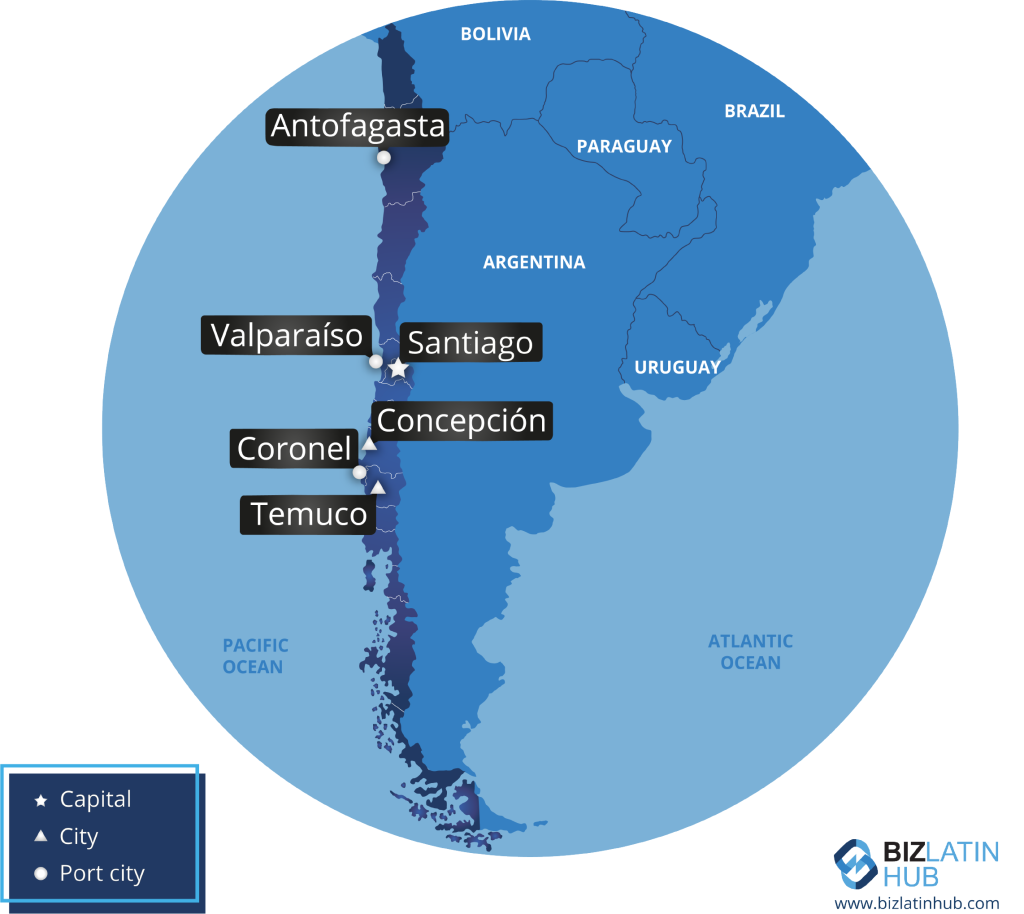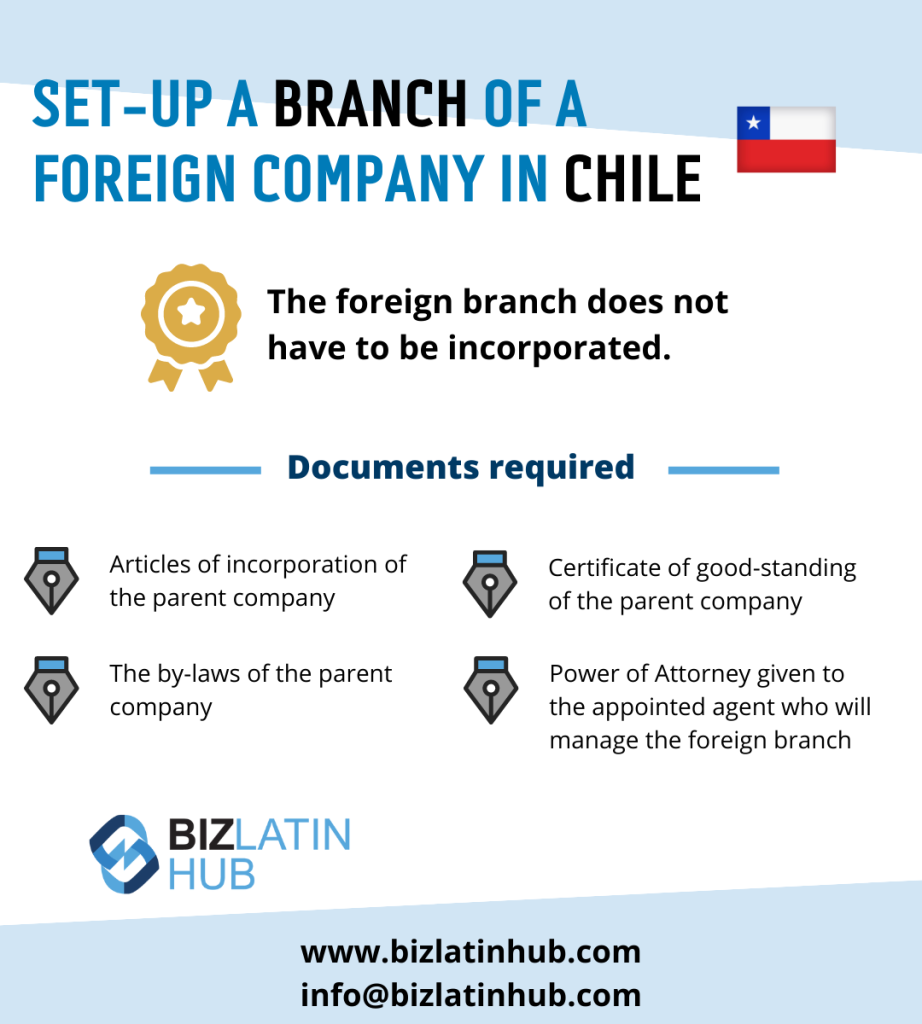Chile is one of the most stable and prosperous countries in South America, considered a model for political and financial transparency in the region. Over the last decade, its economy has grown strongly, with GDP currently over US$ 335.53 billion.

Foreign investors are attracted by Chile’s abundant natural resources, the stability of the macroeconomic system and other factors such as high growth potential, legal certainty, low level of risk, and high-quality infrastructure. Foreign investors are actively interested in such benefits, including about US$8.224 billion investment in 2018, +28% in comparison to 2017.
According to the Chilean Under-Secretary of Tourism, tourism generated US$4,604 million, with 2,877,087 international travelers entering the country. Chile expects a further 8.5% increase in the number of incoming tourists (about 6.4 million to 7 million) over the coming months.
Additionally, greater business connections and a more open commercial environment means companies expanding into Latin America to explore their trading prospects are looking towards Chile for their regional hub. Greater movement of goods and people puts a high demand on the available commercial air travel.
How to Register an Airline in Chile – Chile Aviation laws
Chile applies the International Civil Aviation Convention to its local aviation regulations. The aviation industry is regulated by two entities, the Dirección General de Aeronáutica Civil (DGAC) and Junta Aeronáutica Civil (JAC). Utilizing the Air Force, the DGAC’s objective is to regulate and inspect air activities in Chilean airspace. It manages the country’s airport infrastructure and all aspects of flight and ground safety (including meteorological elements).
The DGAC is also responsible for ensuring the efficiency of sites and air traffic. The responsibilities and authorities assumed by the DGAC are governed and defined by the Aeronautical Code and by Act No. 16,752 of Chile.
The JAC is in charge of the promotion and commercial aspects of the Chilean aviation sector and relies on the Chilean Ministry of Transportation to achieve its objectives. Three pieces of legislation govern the powers, duties, and other functions of the JAC:
- Código Aeronáutico (Aeronautical Code)
- Decreto con Fuerza de Ley (DFL) No. 241 of 1960 (Decree with Force of Law)
- Decreto de la Ley de Aviación Comercial (DL) Decree No. 2564 of 1979 (Commercial Aviation Act)
The government, through the JAC, has now been implementing a policy for six years called “La política aerocomercial de cielos abiertos” (The Open Skies Commercial Air Policy), which is based on different principles.
- Free access to markets — If a company meets technical and insurance requirements, does not see its number of flights within the country unlimited. However, this does not matter whether it knows of a Chilean or foreign company
- Price freedom — No price restrictions, airlines are free to apply whatever they wish on their flights, without the State being my own to say
- Minimal intervention by authorities — For the market to be self-regulating (principle of free competition and prices to adjust to demand), limiting them only to administrative requirements
- Liberalization of control and ownership — Airlines operating in Chile are under no obligation to be owned in part by a Chilean. They can exclusively be owned by foreign capital. The opposite is also exact: an air company owned by Chilean capital is not forced to operate on Chilean territory
On 4 June 2018, the JAC established the third version of the Programa Nacional de Facilitación del Transporte Aéreo Internacional (PNFTA) with two main strategic axes:
- Institutionalization of facilitation: Setting up actions to facilitate management by administrations as well as the facilitation of international cooperation
- Strengthening infrastructure management: Creating an environment that helps airports to manage more quickly and efficiently.
How to register an airline company in Chile
To properly register your airline in Chile, you must already have completed the correct administrative procedures for company formation. With the expert advice of a local legal team, you can seek guidance on ongoing corporate compliance matters
Briefly, the following steps are key requirements for registering your company in Chile.
- Name the proposed company
- Brief description of the company’s activities
- Shareholder details
- Contact details of the company director
- Address of the head office in Chile
- Memorandum and Articles of Association.
Seek guidance from a legal representative
You can seek a legal representative in Chile to act on behalf of your company to carry out this process. Your representative will be useful to you in drafting your incorporation deed, obtaining legal advice and optimal capital structure for the company, and identifying other crucial commercial and employment requirements to keep your business compliant with the law.

In obtaining your tax identification (known as Rol Unico Tributario or “RUT”), you then need to do the following:
- Have the public deed signed
- Wait until your RUT is processed by the Servicio de Impuestos Internos (SII).
- Register your company with the “Registro de Comercio”.
- Publish your new company in the Official Journal (Diario Oficial).
- Open a local bank account in Chile.
- Submit the articles of association to the Commercial Register and publish them in the Official Journal.
Apply for your Airline Operation Certificate
If you wish to operate as an air transport company, you’ll be working with the Dirección General de Aeronáutica Civil (DGAC) to make it happen.
You must submit a Certificado de Operador Aéreo (AOC), or The Open Skies Commercial Air Policy in English, to DGAC in order to register your airline. It will allow you to carry passengers, cargo, or perform aerial work in accordance with aviation safety parameters.
To obtain your AOC, you will have to meet specific requirements and submit the documents listed below:
- Send a letter of intent to the Executive Director to get an information meeting
- Once the letter has been received, the DGAC organizes the meeting with relevant stakeholders to validate the request.
Meeting with DGAC
During the meeting, DGAC assesses several aspects of your proposed company procedure:
- Maintenance, and the preparation of the maintenance control manual and the Minimum Equipment List (MEL) manual (if applicable).
- Concessions
- Proposed airport facilities, routes, and services.
- Your airline’s operations manual, crew training programs, operational security plan, airport security plan, procedures, and other details
- Legal compliance, incorporation, contracts and aircraft registration.
For commercial passenger airlines, the applicant should also submit their civil and passenger seat insurance to the Civil Aeronautics Board of the Ministry of Public Works, Transport and Telecommunications.
Be prepared when working with the DGAC
The DGAC requires that all necessary documents be sent at least 60 days before this meeting. After the meeting and assessment of information mentioned above, DGAC will validate the application, the Junta de Aeronáutica Civil (JAC) approve the insurance and experts have confirmed that the facilities, aircraft, licenses. Also, provided the qualifications of crew members, operating staff, and technical maintenance personnel comply with safety standards, the DGAC issues the AOC certificate. With this certificate, your airline will be able to operate on Chilean soil and air.
Doing Business – Why work in Chilean aviation?
With 22.32 million passengers in 2017 (11% increase / 2016). LATAM Airlines transported 63% of them, with about 52% of domestic flights, the country’s domestic market is the largest, with an estimated growth rate of 16% for the year 2018, a good result is expected in 2019.
The majority of international passengers coming to Chile are Argentinean (51% of international passengers). So it is logical that Chile’s most significant international company should be Aerolineas Argentinas (3rd on the country’s total volume).
A market with one of the highest potentials
The Chilean aviation market recently opened to competition and is full of dizzying potential. This move was driven by the JAC which wishes to unilaterally open up the Chilean air market, whether for freight or passenger transport. As Chile currently probably has the highest per capita travel indicator in South America, facilitating foreign company expansion into the market is set to fuel a market boom.
The entry of these new operators further enables an increase in business travel, tourism, study, and cargo transport.
This is an exciting opportunity for professionals in the sector, with a growing market without competition and with one of the highest potentials in Latin America.
Connecting Chilean cities with each other and with the rest of the world benefit not only the country itself but also the actors of this transformation. As a foreign investor, you can benefit significantly from the expansion of your airline business in Chile, and help shape the future of the country’s connectivity with the rest of the world.
Want to know more? Contact our local legal expert
As the primary destination for foreign investment in Latin America, the Chilean government today is making great efforts to attract new players to its shores. With more flexible legislation and a sector that is still under-explored, there has never been a better time for you to enter the aviation sector.
It’s essential for new arrivals into this economy to understand the complicated legal registrations and processes. Company formation can be a complex procedure, but partnering with a trusted local entity can ease this burden and
Biz Latin Hub’s team of legal and accounting experts offers key advice and guidance for all company formation and corporate compliance requirements in Chile. We can help you get off the ground confidently, knowing that all market entry and back-office needs are taken care of.
Contact our Chilean commercial specialists for more information and personalized assistance.






